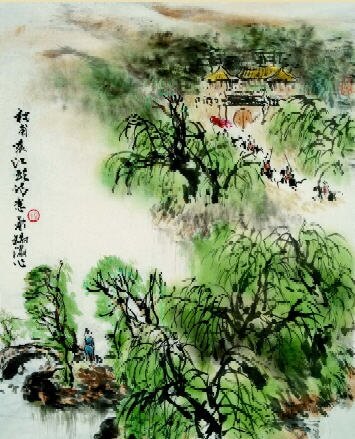A Song of Sobbing By the River
- Poetry of Du Fu

I am only an old woodsman, whispering a sob,
As I steal like a spring-shadow down the Winding River.
...Since the palaces ashore are sealed by a thousand gates --
Fine willows, new rushes, for whom are you so green?
...I remember a cloud of flags that came from the South Garden,
And ten thousand colours, heightening one another,
And the Kingdom's first Lady, from the Palace of the Bright Sun,
Attendant on the Emperor in his royal chariot,
And the horsemen before them, each with bow and arrows,
And the snowy horses, champing at bits of yellow gold,
And an archer, breast skyward, shooting through the clouds
And felling with one dart a pair of flying birds.
...Where are those perfect eyes, where are those pearly teeth?
A blood-stained spirit has no home, has nowhere to return.
And clear Wei waters running east, through the cleft on Dagger-Tower Trail,
Carry neither there nor here any news of her.
People, compassionate, are wishing with tears
That she were as eternal as the river and the flowers.
...Mounted Tartars, in the yellow twilight, cloud the town with dust.
I am fleeing south, but I linger-gazing northward toward the throne.
Folk-song-styled-verse
少陵野老吞声哭,春日潜行曲江曲。
江头宫殿锁千门,细柳新蒲为谁绿?
忆昔霓旌下南苑,苑中万物生颜色。
昭阳殿里第一人,同辇随君侍君侧。
辇前才人带弓箭,白马嚼啮黄金勒。
翻身向天仰射云,一笑正坠双飞翼。
明眸皓齿今何在?血污游魂归不得。
清渭东流剑阁深,去住彼此无消息。
人生有情泪沾臆,江水江花岂终极!
黄昏胡骑尘满城,欲往城南望城北。
- Why Chinese poems is so special?
- The most distinctive features of Chinese poetry are: concision- many poems are only four lines, and few are much longer than eight; ambiguity- number, tense and parts of speech are often undetermined, creating particularly rich interpretative possibilities; and structure- most poems follow quite strict formal patterns which have beauty in themselves as well as highlighting meaningful contrasts.
- How to read a Chinese poem?
- Like an English poem, but more so. Everything is there for a reason, so try to find that reason. Think about all the possible connotations, and be aware of the different possibilities of number and tense. Look for contrasts: within lines, between the lines of each couplet and between successive couplets. Above all, don't worry about what the poet meant- find your meaning.
- · Treading on Grass: After Rain the Landscape’s Fair
- · Tipsy Verse
- · Seated with Fangweng
- · Rain and the Mountain
- · Prelude to Water Melody: Bows and Swords Venture Beyond the Pass
- · Spring in Qin Garden: Painted Prows Pierce the Sky
- · The Trader’s Joy
- · Seeking the Hermitage of the Reverend Yong
- · Dedicated to Yuan Danqiu’s Mountain Home
- · The Temple on the Summit